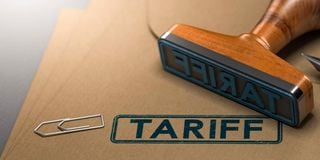Raising tariffs in African countries further weakens their economies

Main roles of tariffs are generating government revenue, protecting local goods against foreign products and restricting foreign goods from flooding the local market.
According to the International Monetary Fund (IMF), taxes are intended to raise revenue for financing government expenditures on goods and services demanded by citizens.
Therefore, it is in the interest of any country to set up a tax system that is efficient and fair. This has been a great challenge to developing countries, given their struggles to be integrated in the international economy.
As advised, developing countries ought to raise the necessary revenue without borrowing excessively, which discourages economic activity and deviates from other countries’ tax systems. Tax can be collected through personal income, corporate income, value-added tax, excises, and import tariffs, among others. However, tariffs are viewed as an easier option for African countries, which import almost everything.
Tariffs are taxes levied on the value, including freight and insurance, of exported and imported goods. It is ad valorem—based on a percentage of the value.
The origin of import tariff is traced back to the Great Depression, when the standard of gold collapsed; hence Britain devised a method of reducing unemployment through imposing import controls.
It was a short-term measure of increasing employment and output with consequences of declining production in the long term. But since it is levied on export and import goods, it generates revenues for governments. It thus benefits the importing government through higher prices as its national welfare falls as it results in a redistribution of income.
Main roles of tariffs are generating government revenue, protecting local goods against foreign products and restricting foreign goods from flooding the local market. In African countries, it could most probably be used for generating revenue since they lack factories to manufacture their own goods, hence have little to protect or limit on their market.
International finance institutions
But is it right for international finance institutions to advise African countries to raise tariffs? Free trade proponents argue that import tariffs burden consumers through increased prices, trigger retaliation from partner countries who greatly benefit from their exports through employment and income and raise deadweight loss by creating inefficiencies on consumption and production sides. Therefore, tariffs suppress the exporting country’s industrial performance, prompting them to retaliate. Is Africa ready to venture into trade conflicts at this time of post-Covid economic struggles.
Globalisation and international economy is what all countries strive to achieve. Therefore, tariff implications by one country might inform sanctions in response. A key example, is the Smooth-Hawley Tariff Act that had all positive intensions but what happened? The competition between the United States and China resulted in high tariffs which hugely damaged the global financial economy, leading to many problems for other countries.
Thus, although the Act had good intentions by questioning the ability of two global players to exchange goods freely, it ended up hurting international trade and global economy.
Is Africa ready to halt its strive towards international trade before restoring its dignity and standing out to be counted among the global economies? If they raise tariffs, they will create entry barriers, which could be beneficial but result in monopolies as only the best companies will remain competitive.
That will limit entry by small foreign firms and start-ups due to the intense competition involving high financial capital. This will harm livelihoods and national economies of countries that require all investors to spur their developmental agenda since lack of entrepreneurship can cause unemployment.
Import tariffs
Therefore, although import tariffs can benefit domestic economies through revenue generation and encourage local manufacturing, it could be irrelevant to the current African case. It is not a suitable approach to fixing the economy as it harms domestic economies through creation of a deficit of goods, limiting consumer choices, increasing unemployment rates and adversely influencing its ability to trade globally.
African states should consider alternatives rather than stick with institutions like IMF and the World Bank, which will relegate them to taking out loans they cannot repay. They can even consider using the Chinese globalisation model and borrow from China Exim Bank or join Brics.
Mr Awil, an international relations consultant, is a former ambassador of Somalia to China. [email protected].




